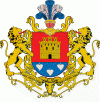Elgoibar
 |
Originally the town was called Villamayor de Marquina, but it had been founded in a place called before Elgoibar field. The town came to be known by this name a few centuries of its foundation. Until the mid-15th century it appears in the documentation as Villamayor de Marquina, but in the statutes of the Brotherhood of Gipuzkoa of 1457 and 1463 years appears with the Elgoibar name and it has prevailed until today. Elgoibar name has been used in Spanish and in Basque in order to refer to the small town. The only difference is that in Spanish the name Elgoibar has an accent mark above its "o".
Elgoibar etymologically comes from the Basque language and is possibly composed of the word elge (meaning "field", usually cultivated), and iba - a word which means "valley" or "plain". Therefore, "elge ibar" would be a similar term to "vega" or "a cultivated field". This etymology would fit quite well with the mention of Elgoibar field that appears in the settlement charter of the town.
Since the very beginning of the establishment of the town, its industrial nature was very relevant. The king kept for himself the strip mining of the minerals such as gold or silver, and the ironworks production. As Tómas López described in 1800 "The industrialization transformed that protoindustry, on a machinery tools factories network; like this is how this village turned into being the "capital city of the Machine Tool".
Main companies
The following list includes companies that are located in Elgoibar, and that have at least an staff of 50 people according to the Basque Industry catalog:
* Alcorta Brockhaus, S.A.: Manufacturer of components of forged steel for the automotive industry.
* AVS Added Value Solutions: Designing and manufacturing equipment for the industry of science and machine tool industry.
* Bernardo Ecenarro, S.A.: Manufacturing paints and special covers for the automotive industry
* Doimak: Manufacturing rectifier machines
Map - Elgoibar
Map
Country - Spain
 |
 |
| Flag of Spain | |
Anatomically modern humans first arrived in the Iberian Peninsula around 42,000 years ago. The ancient Iberian and Celtic tribes, along with other pre-Roman peoples, dwelled the territory maintaining contacts with foreign Mediterranean cultures. The Roman conquest and colonization of the peninsula (Hispania) ensued, bringing the Romanization of the population. Receding of Western Roman imperial authority ushered in the migration of different non-Roman peoples from Central and Northern Europe with the Visigoths as the dominant power in the peninsula by the fifth century. In the early eighth century, most of the peninsula was conquered by the Umayyad Caliphate, and during early Islamic rule, Al-Andalus became a dominant peninsular power centered in Córdoba. Several Christian kingdoms emerged in Northern Iberia, chief among them León, Castile, Aragon, Portugal, and Navarre made an intermittent southward military expansion, known as Reconquista, repelling the Islamic rule in Iberia, which culminated with the Christian seizure of the Emirate of Granada in 1492. Jews and Muslims were forced to choose between conversion to Catholicism or expulsion, and eventually the converts were expelled through different royal decrees.
Currency / Language
| ISO | Currency | Symbol | Significant figures |
|---|---|---|---|
| EUR | Euro | € | 2 |
| ISO | Language |
|---|---|
| EU | Basque language |
| CA | Catalan language |
| GL | Galician language |
| OC | Occitan language |
| ES | Spanish language |















